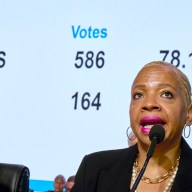TORONTO – Canada’s equalization program that helps poorer provinces is “perverse” and Ontario – struggling with the current economic slowdown – is providing far too much to the federal coffers that fund it, Premier Dalton McGuinty said Wednesday.
A TD Bank report released Tuesday that warned Ontario could slip into have-not status by 2010 and qualify for equalization payments shows the new formula adopted by the federal Conservative government last year isn’t working properly, McGuinty said.
“What the TD paper does is allow us to revisit the perverse dimensions of the existing fiscal network that ties us to the rest of the country,” McGuinty said before a Liberal cabinet meeting. “We have a system in place that to my way of thinking is clearly unfair to Ontario taxpayers.”
McGuinty said Ontario sends the federal government $20 to $21 billion a year more than it gets back in transfers and services, adding the province can’t afford to be so “generous” when it’s bearing the brunt of the slowdown caused by soaring energy prices, a high dollar and a slumping U.S. economy.
“It’s just perverse to say that somehow we are in need, while at the same time we’re sending $20 billion to the rest of the country. It just doesn’t make any sense,” he said.
“It will make (the downturn) more pronounced. The impact will be felt more deeply than it need be in our province.”
Ontario says its taxpayers contribute 41.5 per cent of total federal revenues but the province receives only 31 per cent of federal spending, so it sends more money to Ottawa than its per capita share and it gets less than its per capita share in spending from the federal government.
Equalization is a near $12-billion federal wealth-sharing program that provides funds to poorer provinces to ensure they can provide basic government services at a level comparable to wealthier provinces, but McGuinty complains some receiving provinces are doing better than Ontario.
When the TD report came out Tuesday, federal Finance Minister Jim Flaherty, who had been warning for weeks that Ontario was on the verge of becoming a have-not province, once again called on the province to cut corporate taxes.
McGuinty said Wednesday that unlike other provinces who are receiving equalization payments, Ontario can’t afford to cut taxes because it’s sending Ottawa too much money.
“Well, some of my colleagues are in a position to reduce their corporate income taxes because we sent them 20 billion Ontario dollars,” he said. “If we could keep a few more of our dollars, we might be able to entertain that kind of a conversation.”
However, Ontario’s opposition parties accused McGuinty of using his complaints about the equalization formula to deflect attention from the fact the province’s economy is falling far behind the rest of Canada because of Liberal government policies.
“Mr. McGuinty finds a new diversion every week. I’m sure the weather is coming soon and probably the metric system is going to be blamed by him before too long,” said Progressive Conservative Leader John Tory.
“He’s got to step up and accept some responsibility on taxes, on regulations, on the message that his government is sending that this is not the place in Canada in which to invest and create jobs.”
The New Democrats noted there had been thousands more layoffs announced in Ontario already this week, and said McGuinty must do more to protect jobs and the economy instead of looking to blame someone else.
“Rather than continuing to whine at the federal government or whine at other provinces, I think the McGuinty government should get down to business and start making better policy decisions for Ontario,” said NDP Leader Howard Hampton
“Is the McGuinty government really saying that the federal government should change the tax system so that they take less money from Ontario? How fair would that be for the rest of Canada?”
Ontario finance ministry officials noted that even if the province qualified for equalization payments – TD said Ontario could get $400 million in 2010 and up to $1.3 billion in 2011 – the federal government would simply claw back any money by reducing health transfer payments to Ontario.
















